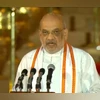Recognised for his political acumen and strategic prowess, senior BJP leader Amit Shah has played a pivotal role in the phenomenal growth of the saffron party which helped it to cross the 300-seat mark in the 2019 Lok Sabha election.
Known as the second most influential figure in the country after Prime Minister Narendra Modi and a person dedicated to the saffron ideology, 59-year-old Shah rose as the BJP's master organiser when its alliance secured 73 seats from Uttar Pradesh in 2014 under his leadership as the party's general secretary.
Often likened to the modern-day Chanakya, Shah made history by becoming the youngest president of the Bharatiya Janata Party at 49 in 2014, later assuming office as one of the youngest Union Home Ministers at 54 in 2019.
Born into a prominent Gujarati family in Mumbai in 1964, Shah's political journey began at the age of 16 when he joined the Rashtriya Swayamsevak Sangh (RSS) as a 'Swayamsevak' in 1980, swiftly immersing himself in the activities of the Akhil Bharatiya Vidyarthi Parishad (ABVP) soon after.
By demonstrating unwavering commitment to the party's principles, exceptional organisational skills, and eloquence, Shah swiftly climbed the ranks, becoming the joint secretary of the ABVP's Gujarat unit within two years.
More From This Section
Transitioning into mainstream politics in 1987, Shah aligned with the youth wing of the BJP, the Bharatiya Janata Yuva Morcha (BJYM).
His appointment as the secretary of the BJP's Ahmedabad city in 1989 marked a significant milestone in his political trajectory.
Shah's influence continued to grow as he assumed key roles, such as serving as the chief campaigner and election strategist for stalwarts like Atal Bihari Vajpayee and Lal Krishna Advani.
His electoral victories in the Gandhinagar Lok Sabha constituency in 2019 and 2024 further solidified his position as a formidable leader.
Throughout his career, Shah has held various key positions, including national treasurer of the BJYM in 1997 and multiple terms as an MLA from Gujarat. His tenure as Gujarat's home minister saw him managing an extensive portfolio of 12 crucial departments.
Not without controversy, Shah faced legal challenges, notably in a high-profile fake encounter case in 2010. However, he emerged unscathed, with the court ultimately ruling in his favour, dismissing the charges as politically motivated.
Among his many achievements, Shah's tenure as the BJP president from 2014 to 2019 witnessed significant electoral victories and organisational growth across various states, solidifying the party's presence nationwide.
Transitioning to the role of Union Home Minister in the second Modi government, Shah continued to play a pivotal role in shaping key policies, including the abrogation of Article 370 and the enactment of the Citizenship Amendment Act (CAA).
Known for his meticulous approach, Shah's tenure has been marked by proactive decision-making and a commitment to strengthening national security and justice systems, exemplifying his enduring influence in Indian politics.
In a bold move that aimed at reshaping the landscape of the country's criminal justice system, Shah introduced three revolutionary laws aimed at modernising and replacing outdated British-era legislation.
The Bharatiya Nyaya Sanhita 2023, Bharatiya Nagarik Suraksha Sanhita 2023, and Bharatiya Sakshya Adhiniyam 2023 are set to replace the Indian Penal Code, Code of Criminal Procedure, and the Indian Evidence Act, marking a significant shift towards a more efficient and effective legal framework.
These laws are scheduled to come into effect on July 1, 2024.
Shah has also been instrumental in quelling Maoist violence and restoring peace in the Northeastern states through strategic peace accords.
Beyond his political achievements, Shah has left his mark in the world of sports administration, particularly in Gujarat. An ardent chess player, he assumed the role of President of the Gujarat Chess Association in 2006.
Demonstrating his commitment to holistic child development, Shah introduced chess in schools in Ahmedabad, emphasising the importance of nurturing both the body and mind.
Shah's influence in sports continued to grow as he took on leadership roles in cricket associations. His tenure as President of the Ahmedabad Central Board of Cricket Association and later as Vice President of the Gujarat State Cricket Association showcased his dedication to fostering sporting excellence.
Shah oversaw the reconstruction of the Motera Cricket Stadium in Ahmedabad, now famously renamed the Narendra Modi Stadium, solidifying its status as one of the world's premier sports venues.
Additionally, Shah serves as a trustee of the revered Somnath temple, standing alongside prominent figures such as Modi and Advani.

)
